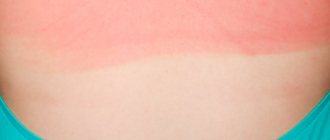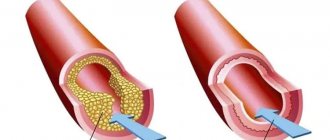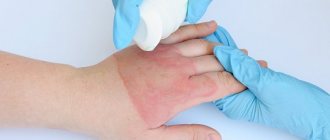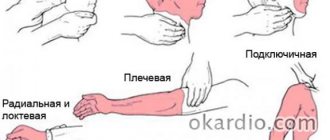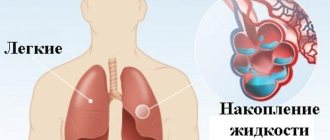Food poisoning is a pathological condition that occurs as a result of consuming low-quality, spoiled foods contaminated with pathogenic microorganisms and their waste products. The disease is not contagious, which means it is not transmitted from one person to another.
Most often, poisoning is caused by bacteria of the E. coli group, clostridia, staphylococci and salmonella.
Main symptoms of poisoning
When poisoned food enters the body, toxins enter the intestines, and from there through the mucous membrane they penetrate into the systemic bloodstream, causing clinical manifestations. The following symptoms are observed for food poisoning:
- Dyspeptic syndrome (nausea, vomiting, diarrhea).
- Weakness, malaise, decreased performance.
- Paleness of the skin.
- Increased heart rate and respiratory movements.
- Reduced blood pressure.
- Pain in the abdominal area.
- Increased body temperature.
In severe cases, the development of visual disturbances, the appearance of hallucinations and disturbances of consciousness (stupor, stupor, coma) are possible. If emergency assistance is not provided to the patient in such a situation, death is possible.
What can you eat in the first days
You can eat a few hours after the last episode of vomiting or loose stools. There are no strict recommendations: most likely, you yourself will feel when you want to eat. It is better to start with light foods: rice, bread, saltine crackers or bananas.
“One of the most proven diets is BRAT (banana, rice, applesauce and toast) - includes bananas, rice, applesauce and bread. This set contains essential microelements, fiber and is quite easily digestible. When your stool normalizes, you can switch to your usual diet,” says Alexey Olegovich.
In the first days, you should refrain from foods that increase gastrointestinal motility: drinks containing caffeine or alcohol, dairy products, as well as spicy, fried or fatty foods.
When should you see a doctor?
- if poisoning is associated with the consumption of mushrooms, sea fish or canned food (possible sources of neurotoxic substances);
- when consciousness is depressed - if a person falls into delirium, he begins to hallucinate;
- with numbness in the limbs or cramps;
- if the temperature is above 38°C for more than a day;
- when streaks of blood appear in the stool or vomit;
- if the condition does not improve after 2–3 days;
- if you have a small child who cannot be given water.
As a rule, specific treatment for poisoning is not required. It is important to maintain bed rest, replenish lost fluid volumes and gradually return to your usual diet. If the measures taken do not bring relief and your health worsens, do not hesitate to call an ambulance.
Source: whealth.ru
First aid for poisoning
Providing emergency assistance for food poisoning is an extremely important event. This way you will cope with the disease faster and avoid complications.
Algorithm:
- Stomach cleansing. To do this, you need to drink a warm, weak solution of soda or potassium permanganate in a volume of 500 ml, and then induce vomiting. The procedure should be repeated until the wash water is clear.
- Taking sorbents (activated carbon, Filtrum) and enveloping drugs (Almagel).
- Drink plenty of fluids (clean water, warm tea, fruit infusions).
- Peace. The patient must be given a comfortable position in bed and ensure maximum comfort.
During the first day of illness, you should refrain from eating. Only drinking is allowed. Starting from the second day, you can start feeding the patient with vegetable soups and weak broths. When symptoms subside, the diet should be expanded, excluding fatty, smoked and salty foods from the menu. Carbonated drinks and coffee are also contraindicated.
First aid: normalize water balance
“For the first three days after poisoning, we recommend maintenance therapy: it is important to prevent dehydration and ensure sufficient calorie intake,” says Alexey Golovenko.
With vomiting and diarrhea, we lose a large amount of fluid that needs to be replenished. When losses are not very abundant, just drinking water is enough.
Drink small sips, but often - this will help cope with nausea without provoking the gag reflex. If you can't drink, you can start by sucking ice cubes.
With excessive fluid loss, signs of dehydration begin to appear: dry mouth and dry skin, weakness, dizziness, decreased amount of urine or its darkening, increased heart rate or breathing rate. In this case, you will need to replace the glucose and electrolytes that have left the body - potassium and sodium necessary to maintain the water-salt balance.
“You can prepare a solution according to a simple recipe: dilute half a teaspoon of salt and 6 teaspoons of sugar in one liter of water and drink a glass. If you don’t have anything suitable on hand, sweet sodas or sports drinks with electrolytes, but without caffeine, will do,” the expert adds.
The most reliable solution would be to buy rehydrating preparations at the pharmacy - powders that contain all the necessary microelements in a balanced composition. You can purchase any ORS (oral rehydration salt preparations), or ORS, oral rehydration solution, if you are abroad.
For children, special solutions are sometimes replaced with apple juice diluted twice - with this treatment it will be easier for the child to drink more liquid.
“We advise you to follow a simple principle: as much liquid comes out, so much should return. Therefore, you should drink a glass of water after each episode of loose stools or vomiting. If the malaise continues for more than a day, it is better to replenish fluid in a larger volume. It is especially important to pay attention to the child’s well-being: children become dehydrated faster and it is more difficult to force them to drink, so if the condition worsens, medical intervention and perfusion therapy may be required,” comments Alexey Olegovich.
Treatment
Treatment of food poisoning must be comprehensive. To do this, you must follow a strict diet and take the necessary medications. You can also turn to traditional methods.
Medications:
- Activated carbon (relieves symptoms of intoxication, relieves nausea).
- Enterosgel (adsorbs toxic substances and promotes their removal from the body).
- Rehydrog (a drug for preparing a water-salt solution necessary to combat dehydration).
- Linex (normalizes the functioning of intestinal microflora).
In severe cases, it is possible to take antibacterial drugs, but they must be prescribed by a specialist.
Folk remedies are also successfully used to treat food poisoning. The most commonly used decoctions are dill with honey, wormwood, marshmallow roots, yarrow, cinnamon tincture and ginger tea.
The diet involves fasting on the first day of illness. Then you should gradually introduce oatmeal in water, boiled, pureed vegetables, weak fish and meat broths, crackers, and lean meat into the diet. Drinks allowed include dried fruit compotes, herbal teas, jelly, fruit drinks, and boiled water.
Until complete recovery, you should exclude pickles, spices, fatty and fried foods, mushrooms, sweets and various sauces from your diet.
What medications are needed
In the first hours after poisoning, any enterosorbents will be useful: they help remove toxins and quickly cleanse the intestines of bacterial waste products. If more than a day has passed since the poisoning, there is no need to take these drugs.
Important! It is better to refrain from the usual activated charcoal: it turns stool and vomit dark, which can mask traces of blood and prevent you from seeing a doctor in time.
Another important rule: do not take antiemetic or antidiarrheal medications without consulting your doctor. Firstly, by blocking vomiting or stool, we prevent the body from eliminating toxins, and secondly, these drugs have a number of serious side effects. Antidiarrheal drugs, for example, can make some types of diarrhea worse and even cause damage to the intestinal wall.
“Most intestinal infections are of viral etiology. Therefore, running for antibiotics for indigestion is not only wrong (only a doctor can prescribe these drugs), but also pointless,” the expert warns.
Enterosgel and poisoning
The drug can be used for intoxication, both acute and chronic, as well as at all stages of treatment (in first aid, first aid, hospital, specialized, at the rehabilitation stage).
Unlike other drugs for similar purposes, the drug is approved for use in children from the first days of life, and is also indicated for pregnant and lactating women.
Enterosgel even removes bacterial endotoxins, promotes the regeneration of damaged mucosa and normalizes the intestinal microflora.
Thus, the functioning of the intestines and immune system is restored. At the first signs of possible poisoning, you can take Enterosgel in a standard dose. Then use the drug according to the instructions for 1-2 weeks.
A sufficient amount of water consumed and laxatives contribute to the rapid removal of toxic products from the body.
Liver protection medications, digestive enzymes, and anti-dysbacteriosis medications will also help relieve intoxication at home.
Signs of acute and chronic intoxication of the body
In case of acute intoxication of the body, the patient experiences:
- heat;
- headache;
- muscle and joint pain;
- nausea;
- vomit;
- diarrhea.
When exposed to strong poisons, there is a serious threat to life. In such cases, urgent hospitalization is necessary, since it is not possible to relieve intoxication at home!
Chronic intoxication may be accompanied by:
- weight loss;
- aversion to food;
- insomnia;
- depression;
- indigestion;
- anemia;
- decreased immunity;
- dermatitis;
- prone to allergic reactions and autoimmune diseases.
With a decrease in the body's defenses and a severe purulent infection, intoxication syndrome develops.
This condition may occur against the background of:
- peritonitis;
- pleural empyema;
- osteomyelitis;
- phlegmon;
- abscess;
- sepsis.
Severe intoxication of the body leads to toxic damage to the heart muscle, nervous system, liver and kidneys.
Palpitations, depression of consciousness or euphoria, kidney and liver failure are the main signs of intoxication syndrome.
The diagnosis is made through blood tests and the leukocyte index of intoxication. This important research method makes it possible to assess the severity of endogenous intoxication and the effectiveness of the treatment.
Normally, the values of the leukocyte index of intoxication range from 0.3 to 1.5. An increase in values from 4 to 9 indicates endogenous poisoning.
How does intoxication manifest itself?
Signs of intoxication depend on the nature of the toxic substance, its quantity, routes of entry into the body and ability to accumulate.
Toxic substances are divided depending on their effect on:
- carcinogenic (cancer-causing);
- mutagenic (leading to mutations);
- cardiotropic (heart muscle is affected);
- hepatotropic (liver intoxication) and others.
Symptoms of intoxication depend on the severity of poisoning:
- light;
- average;
- heavy.
Intoxication can be acute or chronic.
Acute intoxication occurs when poison enters the body once and is accompanied by pronounced symptoms. For example, food intoxication due to salmonellosis, alcohol intoxication.
Acute intoxication in a child occurs due to influenza, intestinal infection, drug overdose, food poisoning, and acetone syndrome. Competent parents know how to relieve symptoms of intoxication at home - they give the baby a drink and give Enterosgel sorbent (not forgetting to call a doctor).
Chronic intoxication occurs with long-term accumulation of toxic substances in the body, for example, cancer intoxication, lead poisoning, tuberculosis intoxication, drug addiction.
...and did you know that
In Moscow, every twentieth patient delivered by ambulance to city hospitals is diagnosed with acute poisoning.
In the structure of the causes of acute poisoning:
- 80% of cases are due to erroneous intake of a chemical substance;
- 18% of cases - an attempt to commit suicide (suicide);
- 2% of cases are intoxication at work.
How to relieve alcohol intoxication?
Unfortunately, the morning after a festive “alcoholic evening” is not always good. My head is pounding, my mouth feels like the Sahara Desert, my heart is pounding somewhere in my throat, it’s cloudy and stormy, a cat is loudly stomping around the apartment - a nightmare, in a word!
Mild alcohol intoxication, or, more simply, a hangover, is usually treated at home.
What needs to be done: get enough sleep, take Enterosgel sorbent on an empty stomach, be sure to have breakfast and drink clean water throughout the day.
A drip for alcohol intoxication at home can be prescribed if you need to immediately “get back on track.”
Diagnosis of food poisoning
When a patient is admitted with suspected food poisoning, the doctor first records complaints and tries to establish the cause of the deterioration of the condition. It is important to tell everything here - the more information a specialist receives, the easier it will be for him to establish the cause of poisoning.
Next, you must undergo a whole range of tests. In order to identify the pathogen, bacteriological culture of feces and vomit is carried out. If the patient suspects which foods caused the poisoning, food samples are also sent for testing. A blood test for toxins and viruses is mandatory. After establishing an accurate diagnosis, a treatment regimen is developed.
Poisoning with ethanol and its surrogates
According to the World Health Organization, more than 300 thousand people die annually from intoxication with alcohol and its substitutes.
According to the international classification (ICD10), the toxic effects of alcohol are coded as T51.
One of the largest cases of poisoning with surrogate alcohol occurred in the Estonian city of Pärnu in 2001: workers at one of the plants stole 20 canisters of methyl alcohol. As a result, 68 people died from poisoning, and 43 became disabled after intoxication.
Methyl alcohol is a potent poison of the vascular and nervous system. It is quickly absorbed and very slowly eliminated from the body.
Typical results of methanol poisoning are blindness, cerebral edema, and cardiac and respiratory arrest.
Intoxication of the body when working in hazardous industries
Why did the Mad Hatter from Alice in Wonderland lose his mind? Perhaps it's all in the bag! Or rather, in the processing technology of the felt from which they are made. It turns out that in the 19th century mercury was used to process this material. Chronic intoxication of the body with mercury vapor causes progressive dementia. In England there was even a saying: “mad as a hatter.”
Occupational chronic intoxication these days, unfortunately, is also not uncommon. People who work for a long time in production associated with chemicals gradually accumulate toxic compounds in their bodies. For example, liver intoxication is not so uncommon in chronic lead poisoning.
Symptoms of intoxication in occupational benzene poisoning are associated with toxic effects on hematopoietic organs and blood cells.
Signs of occupational poisoning depend on the toxic substance entering the body.
Common signs of chemical poisoning:
- severe weakness;
- clouding of consciousness;
- dyspnea;
- changes in skin color;
- nausea and vomiting;
- in acute poisoning - loss of consciousness.
Detoxication in such cases is carried out in intensive care units or intensive care units.
Timely intake of Enterosgel sorbent at the first symptoms of intoxication will save you from the dangerous complications of poisoning or reduce its manifestations.
2.How can harmful microbes get into food?
- During meat processing. There are bacteria in the intestines of animals that humans use as food. This is normal, but sometimes bacteria also get on those parts of animals (meat) that we eat.
- Because of the water that is used to water or wash fruits and vegetables. If there are microbes in this water (most often these are microbes from animal manure and household wastewater), they can transfer to the food.
- While cooking. If items that have germs on them come into contact with food, the germs can be transferred to them. For example, if you use the same cutting board to cut vegetables and raw meat, germs can transfer to the vegetables. The same thing happens if you don’t wash your hands well after cutting meat.
Visit our Therapy page
“Household” intoxication or “reality poisoning”?
It is not for nothing that household poisoning is called the “epidemic of the century”, because quite often the means that are supposed to make our life easier become the cause of acute intoxication. Bleach, pesticides, detergents and cleaners, car windshield wipers - the list of potentially dangerous culprits of severe poisoning is quite extensive.
The number of poisonings due to the erroneous use of household chemicals, especially by children, has increased significantly in recent years. Cases where children's curiosity ends tragically are not so rare in everyday life: either a two-year-old girl swallows a “Mole” for cleaning pipes, or an older boy decides to try a powerful detergent advertised on TV.
After intoxication with household chemicals, acute renal and liver failure occurs. Stopping the work of these vital organs that remove toxins from the body can, in some cases, even lead to the death of a person.
How to treat intoxication?
Therapy for exogenous and endogenous intoxication of moderate and severe severity is carried out in intensive care units, intensive care units, and toxicology centers.
Treatment of acute and chronic intoxication is carried out taking into account the cause of poisoning, the severity of the patient’s condition, the results of laboratory and instrumental studies.
Removing intoxication in each specific case has its own differences.
Treatment of cancer intoxication is palliative, that is, drugs are prescribed that improve the quality of life of an incurable patient. For cancer intoxication, narcotic analgesics (morphine), sorbents (Enterosgel), and nonsteroidal anti-inflammatory drugs are prescribed. In a hospital setting, a drip is performed for intoxication with the administration of drugs that remove toxins from the body.
Therapy of tuberculosis intoxication involves a long course of treatment with anti-tuberculosis drugs, vitamins and immunostimulants.
For household and professional poisoning, antidotes (antidotes), detoxification of the body, gastric and intestinal lavage are used to cleanse toxic substances.
Enterosgel intestinal sorbent will help quickly and effectively relieve intoxication at home in case of poisoning.
Poisoning in animals
Don’t think that only humans can get poisoned. “Our smaller brothers” often suffer from poisoning. The reason for this is the well-known hunting instinct, when a dog or cat conducts a “study” of new substances, testing them to their teeth.
- Symptoms of poisoning in cats and dogs arise from intoxication with various chemicals, poor quality food, medications, and insect bites;
- Symptoms of poisoning in dogs and other pets: lethargy, drooling, refusal to eat, vomiting, loss of coordination, diarrhea, dilated pupils, convulsions.
If signs of poisoning appear, contact your veterinarian!
Causes of food poisoning
One of the world's "high-profile" cases of food poisoning: In Germany in 2011, about 4,000 people were hospitalized as a result of mass poisoning, 53 of whom did not survive. It took several months to trace the source of the infection. As a result of numerous studies, the cause of the outbreak of food poisoning was established - it turned out to be fenugreek seeds imported from Egypt, the sprouts of which are used as a seasoning for dishes. Food poisoning is common. The peak incidence occurs in the warm season. Food poisoning in an adult is provoked (symptoms and treatment will be discussed below) by various microbes and bacteria, the toxins they secrete and their metabolic products (exo- and endotoxins), as well as non-microbial poisoning (toxic products).


